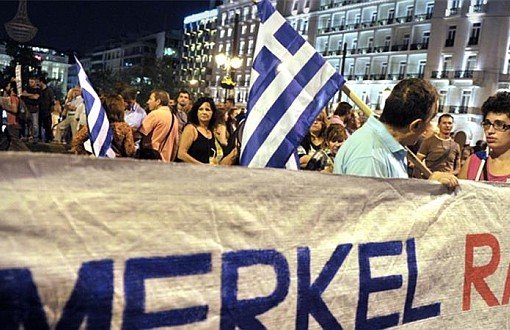Those who still have something to lose mostly say ‘Yes’, while the unemployed and those devastated by the crisis hope that saying ‘No’ might put a hold on to austerity and help them find a way out of it.
This is actually a battle taking place since the beginning of 2012 and this is the second bailout package of Greece, as most people weren't really aware of the consequences when the first IMF rescue package began implementation five years ago. Those opposing austerity thought SYRIZA as a unifying force after Greek elections which were held in May 2012 when it managed to receive 16% of the vote and became the major opposition force in the Greek parliament.
The dilemma now imposed to the Greek citizens has been presented once before in June 2012 elections when the pro-austerity parties managed to win after practicing brinkmanship over the mass media.
January 2015 elections which SYRIZA won easily, forming the first left government in the country's history, showed that media brinkmanship wasn’t enough to stop those opposing austerity and proposing a different path to Europe.
So the next step was to impose capital controls, after failed negotiations between Greece and its European and international creditors.
The creditors didn't respond almost any of Greece's demands and created a deadlock situation mostly to get rid of the current SYRIZA government that opposes austerity, in order to set a bad example for other anti-austerity parties in Europe.
Unsurprisingly, Greece's creditors are approved by the country's traditional political parties (New Democracy and PASOK) and the new River party which supports a ‘Yes’ vote to the referendum and called for SYRIZA government to form a national united government or a different coalition which could finish a deal with the creditors and the European institutions.
The referendum was viewed as a hasty move by many in Greece and many in and out of the country are trying to make people believe that a “No” vote is a vote against the Euro and the EU. The SYRIZA government, on the other hand, claims that a ‘No’ vote will increase its bargaining power in order to get a better deal which will help the Greek economy get back on its feet sooner.
It is true that after five years of harsh austerity, Gross Domestic Product (GDP) of Greece has decreased approx. 25%, comparable only to a war zone.
Unemployment is approx. 26% among the general population and roughly 60% amongst the young people, many of whom leave the country to find a better future elsewhere.
For some Greeks 60 euro limit per day decided by ATMs means nothing as they have nothing left in the bank anyway...
Many claim that, no matter what the result of the referendum, Greece will eventually remain in the Eurozone and be forced to expose even harsher austerity measures which will really slow down any possible recovery. However, ‘No’ could bring a glimmer of hope to people being humiliated almost every day for the last five years, while a ‘Yes’ vote means that Greeks still accept austerity in order to remain in the Eurozone “no matter what it costs”. Nevertheless, does “no matter what” justify even more burdens ahead?
Daily life will probably become harder regardless of result of the referendum, and the only thing most of Greeks still agree that they want to avoid dangerous national division...
(MK/BD)






